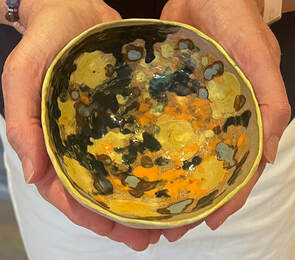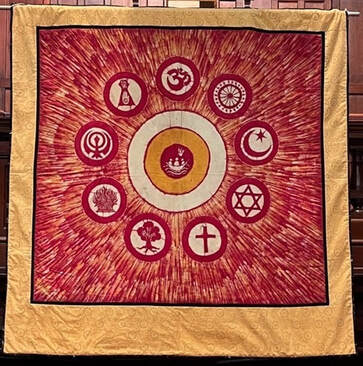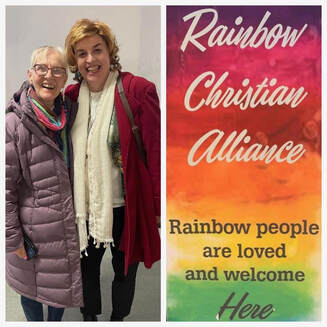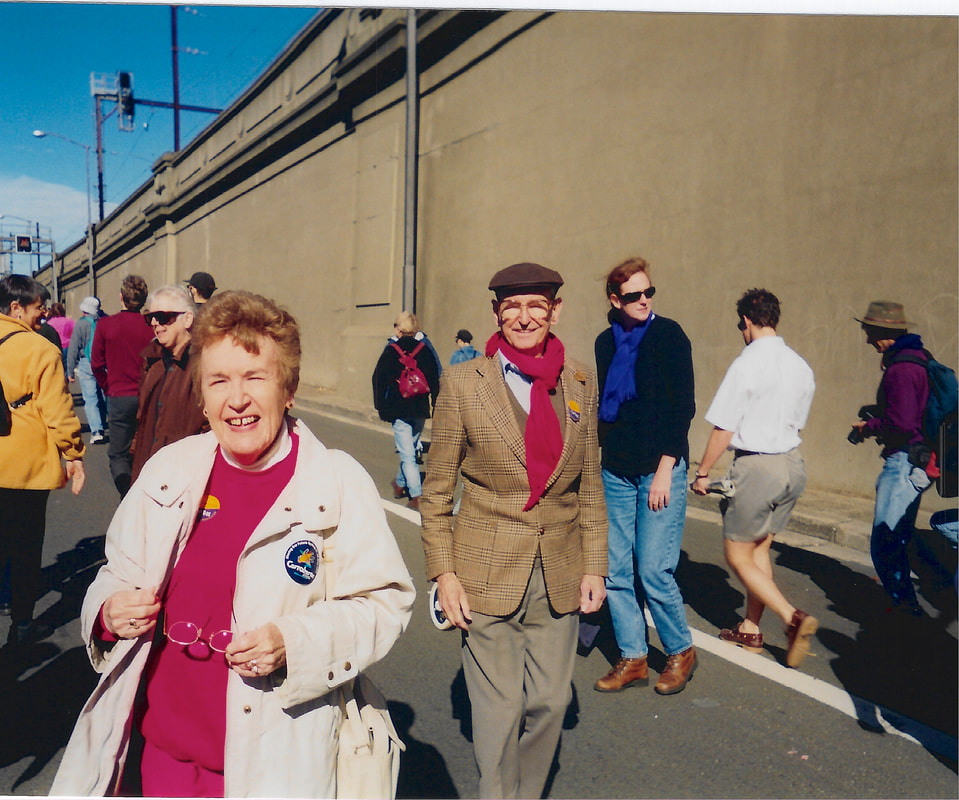
 Our lives and world are shaped by the stories we choose to tell, and how we tell them. That is one reason the study of history is so vital. For it makes a huge difference what we choose to include, remember, and carry forward in the story of ourselves we share. So what story about ourselves and our world do we want to tell, and to carry forward, on this 47th anniversary of the official founding of the Uniting Church in Australia? How does this reflect the vision of church as beloved community which we heard about in our readings (from Ephesians chapter 2.17-22 and John chapter 17.1-11)? And how, vitally, do we see this story developing in the future?
0 Comments
 I thought it might be helpful this morning to bring along a favourite bowl of mine. It was made by an artist friend Kerry Holland, whose paintings and bowl sculptures on the theme of The Visitation is currently on exhibition in Pitt Street Uniting Church. She also made this one, which she gave to me as a gift when I came out as transgender, affirming my authentic gender identity a few years ago. It is precious to me for that reason but also because, like all of Kerry’s bowl sculptures it is unique, with its own particular shape, story, and constellation of colours. In that sense, it is like each human being: an exquisitely unique and special divine creation. The more I reflect upon that, and upon the nature of a bowl itself, the more I am also drawn into the love of God. So I would like to share with you some ways in which each of us might helpfully use a bowl as a prayerful way into appreciating ourselves and others and holding together what can easily be misused in the Gospel parable (Matthew 25.31ff) which we heard read just now. For, whilst that passage is in some ways quite straightforward in the challenge it offers us, it is also presents some questions, particularly in the way it divides people into two black and white binary groups, one of which receives blessed things and the other total condemnation…  image: Rod Long on Unsplash image: Rod Long on Unsplash Of all the critiques of the Ten Commandments I have encountered, it was that of a twelve old girl which was most powerful and poignant. This was many years ago, during a confirmation class I was running. We had looked at various aspects of Christian Faith and were exploring its living out. The Ten Commandments were an obvious element for reflection in this, especially as, like many English churches, they were displayed prominently, alongside the Apostles Creed, on either side of the altar (communion table) in our village church. Typically, they did not evoke much reaction from young people seeking to be confirmed: either because many of the components (such as ‘do not murder’) were fairly easily agreed, or, most often, because confirmands were shy about entering into religious debate with older people. There are ways of changing that, and perhaps today younger people may be more self-assertive, but in general my experience is that confirmation classes can sometimes be hard going for all concerned! Consider my surprise then, when this twelve year old girl, who, even in other contexts, hardly ever said a word in public, suddenly launched an outburst, full of both vehemence and reason. ‘This is shocking, and abusive’, she said, ‘how can this be in the Bible? I cannot accept it.’ Her protest was about a number of things but especially the fifth commandment: ‘honour your father and your mother’. ‘How on earth can I do that?’, she said, ‘when my father so mistreated my mother and left myself and my family when I was so tiny’… What’s in a name? - often, a huge amount. First Nations peoples are very clear about that and the intimate relationship between naming, language more widely, culture, identity and flourishing. Other oppressed peoples know this too. Hence the suppression or promotion of different languages is so vital an issue: just look, for example, at Wales, Catalonia, Belgium or Canada. It is not simply good manners to use the language people ask of us. It is because, unless we do so, we are disconnected from layers of meaning and identity, place and community, history and, indeed, geology. Take my surname: Inkpin. This has nothing to do with writing or being a scribe, or seamstress. It comes from two ancient British words: inga and pen. Inga, in modern English, means people. Pen means hill. This tells me, and others, that I come from the people of the hill, with all the deep layers of connection this entails: to particular soil and environment; to history and culture; to others, past, present and future. Indeed, even today, there are English villages, not surprisingly on hills, with the name Inkpen. For whilst much was swept away by the two great imperial invasions of my native land, there are still fragments of British indigeneity left, and one is my surname. It is a living reminder that there are other ways of being English, and British, than what is usually asserted: there are always were, and there always will be. For when we look more deeply, the living fragments of traditional cultures in every land call us both to recognition of pain and loss, and also to fresh pathways of justice. This is part of today’s Day of Mourning. We will not find peace unless we recognise what has happened in this land - and particularly in this city; unless we repent – and much more radically than we whitefellas have so far done; and unless, in Midnight Oil’s words earlier,[1] we ‘come on down’ to the makararrata place, ‘the campfire of humankind’, ‘the stomping ground.’…
 image: Gareth Harper on Unsplash image: Gareth Harper on Unsplash I want to begin by inviting you to look up - Look – here! at this trinity of angels, symbolising Courage, Compassion and Joy. Jyllie Jackson, the artist who with her team created them, saw these as qualities particularly embodied – incarnated indeed – here in our community at Pitt St Uniting Church. Those of us who worship here regularly – can we see ourselves I wonder? It is hard sometimes to see ourselves as others see us! And those of you visiting here today – I wonder what aspects of yourselves you see here in our angels? For they are icons of incarnation...  photo: John Canada on Unsplash photo: John Canada on Unsplash .A number of years ago, Penny and I were exploring the possibility of employment with a wonderful pioneering female bishop. In the course of her hospitality she introduced us to a fellow, nearby, bishop in case he also had a parish to offer us to work in. He however took one brief look at us, and, at once, abruptly asked ‘do you believe in the Resurrection?’ It was said in a very demanding, and almost accusatory, tone. Taken aback though we were, we actually responded very well, saying together, and in a somewhat incredulous tone, ‘why yes, of course!’ The bishop was nonetheless not at all impressed and exited immediately. For, of course, his question was not one to which he really expected an answer, or at least one in which he was actually interested. Like the notorious enquiry ‘when did you stop hitting your wife?’, it was a deliberately loaded question, containing its own assumptions. Like the Sadducees’ question to Jesus in today’s Gospel reading, it was also not really about resurrection at all. How often, I wonder, are our own questions like that too? When we talk in faith spaces, how much do our own interests intrude? How do we keep open to the mystery of resurrection?...  "What's in a name?”, said Juliet: “That which we call a rose. By any other name would smell as sweet.” Shakespeare’s famous lines speak of the power of names and designations. He presents Juliet, on her balcony, musing on the rose as a metaphor, in the context of her love for Romeo and the intense, age-old, conflict between two tribes - the Capulets (Juliet’s mob) and the Montagues (Romeo’s mob). Juliet proclaims that names have no ultimate meaning, other than those which people are willing to give them. As she puts it, in reference to Romeo: “Tis but thy name that is my enemy…. What’s Montague? It is nor hand, nor foot/ Nor arm, nor face. O be some other name/ Belonging to a man.” We do not, says Juliet here, have to be controlled by our names, by our tribes. We can choose how to live with them, and, in love, transcend them. Of course, Shakespeare’s story of the young lovers ends in tragedy. It is challenging to live with, and beyond, our names, our tribal identities. It can bring misunderstanding, opposition, and much worse. Yet is this not the path of true love, in the fullest dimensions of those words? Certainly, as we come today to bless our beautiful new interfaith banner, we do so in awareness of that same call to honour the different names of God, and not to let them control and divide us. For in the depth of all the world’s great wisdom traditions, true love, divine love, is not simply about reaffirming what is valuable in our tribal identities. True love is also about walking paths of inner and outer transformation together…  If I was to ask any group of Christians what titles for Jesus they knew and used most, what do you think they/we would come up with? Lord and Christ would probably be the first titles in the list, followed by others such as Saviour, Shepherd, Brother, Friend, Son of God, Son of Man and so on. The Way, the Truth and the Life, together with the Bread of Life, would also be likely to get an early look in. What about Gate, or the Gate, though? I reckon that would pretty low down the list, don’t you? Yet, Gate is a very important title for Jesus, and, arguably, a key title often honoured very much in the breach down the Christian centuries. For, let’s face it, Christians have spent an inordinate amount of time using Jesus as a means, a gate, to exclude and keep people out, or to stop one another going out, and, in the words of Jesus in our Gospel reading tonight, finding good pasture. We don’t even have to be members of the LGBTIQA+ community to know that such gatekeeping is so very much still alive and with us in both our world and its Churches. This is such a great shame, not simply because of the harm caused, but because, as John’s Jesus proclaims, the Gate of Christ is precisely created to open up our lives and world to deeper meaning and more loving relationships. One of the vital gifts of Queer theology and Queer Church spaces is therefore to share Jesus as the Gate to life in all its fullness, and for the followers of Jesus to become ever more alive signs of that holy abundance. That, at least, is at the heart of my reflections on this wonderful bible passage (John chapter 10, verses 7-10) which we just heard…  the late Valwyn Wishart, with other Pitt Streeters, at the Reconciliation Bridge Walk in 2000 the late Valwyn Wishart, with other Pitt Streeters, at the Reconciliation Bridge Walk in 2000 ‘By faith’ – what a powerful and ringing repeated phrase that is in the Letter to the Hebrews chapter 11. Last Sunday and this Sunday we have heard it read in two parts, telling some of the stories of those who have gone before us in the story of God as told in the Bible. This great passage relates the stories of so many heroes of faith in the Hebrew traditions. ‘By faith’ – the Letter affirms so strongly how all kinds of extraordinary events and achievements flow from the power of trust and courage that true faith enables. Note well: this is faith not as a set of beliefs or practices or organisational structures, as so many would have us see ‘faith’ today; but biblical faith, which is about inspiration, risk, and energy. As such, it encourages us to take heart, to draw on similar energy, and to take risks in our own day. What might we ourselves seek to achieve?...  photo: by Hello I'm Nik on Unsplash photo: by Hello I'm Nik on Unsplash The stories of the great biblical prophets are certainly extraordinary, not least those of Elijah and Elisha. As Penny said last week, in some ways such biblical narratives are really top cartoon action stuff. That is certainly true of our story from the Hebrew Scriptures today. This contains powerful features which have had enduring value in faith communities, and elements which have been overlooked. There has also always been a good deal of tidying up, and ignoring, of some aspects of the narratives. For one thing we can assuredly say about the prophets is that they are not comfortable figures. We see this too in the story of Jesus which we will come to later. After all, as we have just sung, in John Bell’s words, Jesus is a ‘provocative preacher’, an ‘itinerant teacher‘, and an ‘outsider’s friend’. Be clear about that if you want to follow Jesus – all things may be up for grabs and turned upside down. To put it another way, your life and world may be profoundly queered... |
Authors
sermons and reflections from Penny Jones & Josephine Inkpin, a same gender married Anglican clergy couple serving with the Uniting Church in Sydney Archives
June 2024
Categories
All
|

 RSS Feed
RSS Feed